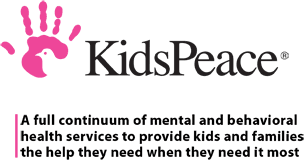KidsPeace Helps Central American Children

On September 25th, Michelle Williams, KidsPeace Executive Director of the Pennsylvania branch, spoke to seniors currently enrolled in the social studies course Contemporary Issues in Education, Immigration, Terrorism and The Environment, about the involvement KidsPeace is taking in assisting unaccompanied alien children that have entered the United States.
KidsPeace provides safe havens for non-delinquent unaccompanied alien children under the age of 18. Upon arrival at KidsPeace, the children are immediately immunized due to the lack of medical records from their home countries.
Serving as a safety net, KidsPeace is able to keep children for 30 days until a viable sponsor is found. Sponsors are then responsible for the child, and it is with their sponsors that the child will appear before a court.
Thus, KidsPeace is not concerned about the documentation of these children, nor of the sponsors. The organization is more concerned about connecting these oftentimes young children with a familiar face in an unfamiliar country.
About 88 percent of children are reunited with someone they know: 22 percent find their mothers and 17 percent find their fathers. However, seven percent return to their home countries on their own terms.
As KidsPeace aims to provide shelter care, the staff tries valiantly to communicate with the children. The staff features bicultural and multilingual people; however, due to some distinct dialects in the Mexican region, finding a staff member who knows the exact dialect can be challenging. There has been only one case where the dialect, of Mayan descent, was too foreign for the staff of KidsPeace.
This year was unprecedented, with a record breaking 66,000 children crossing the border as of August 2014. In 2013, only 35,000 unaccompanied children trekked across Central America into the United States. The recent influx has caught media attention and brought the issue of immigration to a forefront.
Most children are leaving Central America because of the terrible conditions persisting at home: gang involvement, poverty, rape, homicides, and human trafficking.
Guatemala boasts the highest percentage of children leaving the country with 35 percent, but El Salvador and Honduras are witnessing 27 percent and 25 percent of unaccompanied alien children in the United States, respectively.
The biggest issues persist in Honduras, which holds the highest homicide rate, and highest gang member involvement at 36,000. Honduras also ranks the fourth highest in human poverty. These numbers appear to be the most dramatic, but are reflective of surrounding countries.
The most alarming of the commonalities between these Central American countries is the prevalence of gangs. Some gangs, such as the 13th Street Gang which has ties in Reading, are even reaching into the United States. Gangs hold enormous power because there are no firearm restrictions whatsoever.
To escape these conditions, families are sending their children to the United States in hopes of a better and safer life. In the past, parents would typically come to the United States and send money back to their families, but the conditions have deteriorated in their home countries so significantly that kids are being sent to the U.S. instead.
“The Death Train” or “Beast” transports thousands of children from Central America into the United States. This part of the journey is the most dangerous, as many children are often knocked off the trains or raped along the way.
Some families may have saved the US equivalent of four thousand dollars to pay for a “Coyote,” which can sometimes be a safer alternative than the train. However, “Coyotes”, a network of smugglers who help migrants enter the United States, can exploit families and demand more money as a price for the child’s life.
Their journey is filled with many obstacles, and coming out unscathed is a slim chance. But, it is in the United States that these children are able to find some peace.
Under the Unaccompanied Alien Children Settlement of 1997, border patrol must segregate delinquents versus non-delinquents, give appropriate treatment, and release detainees in a timely manner.
KidsPeace aims to help these children, whether undocumented or not, and it is up to the legal proceedings to determine the eligibility status of the children.
“We’re not building a wall around the border,” Williams said, “so it’s a matter of how we respond to [the children’s] needs.”

Ashley Zamichieli has been on the Spotlight staff for four years. Starting as a freshman staff reporter, she progressed to features editor in tenth grade,...

